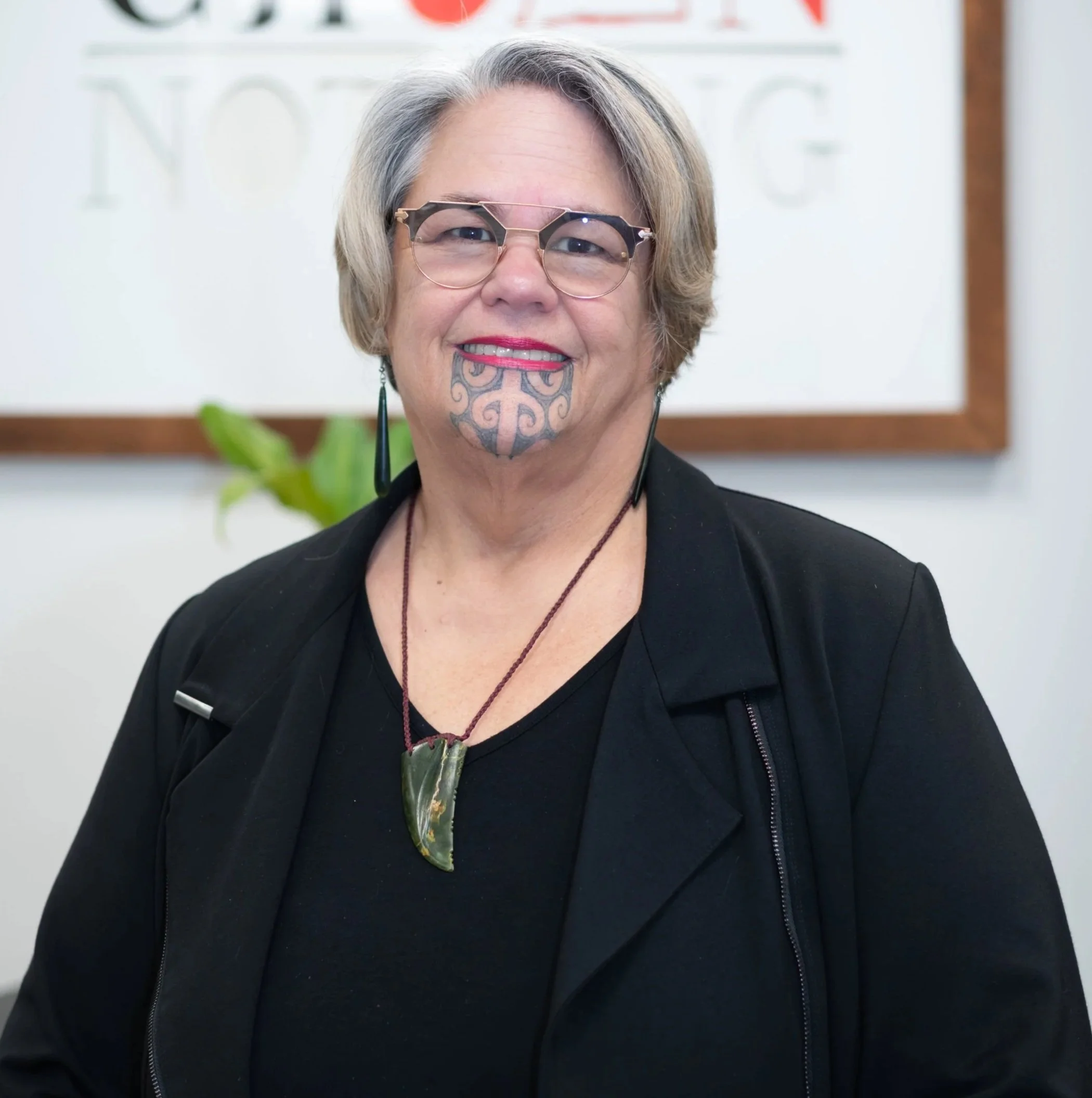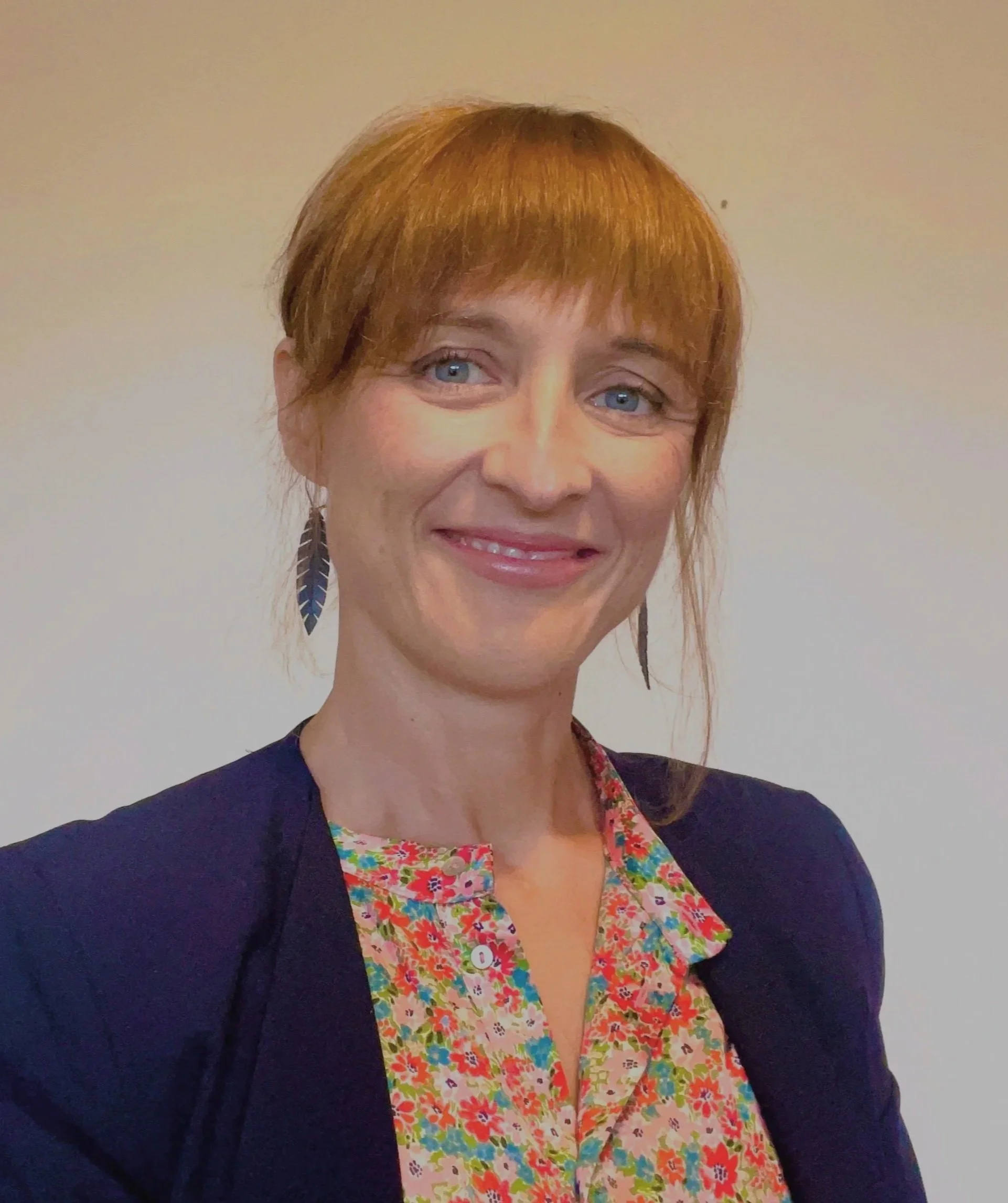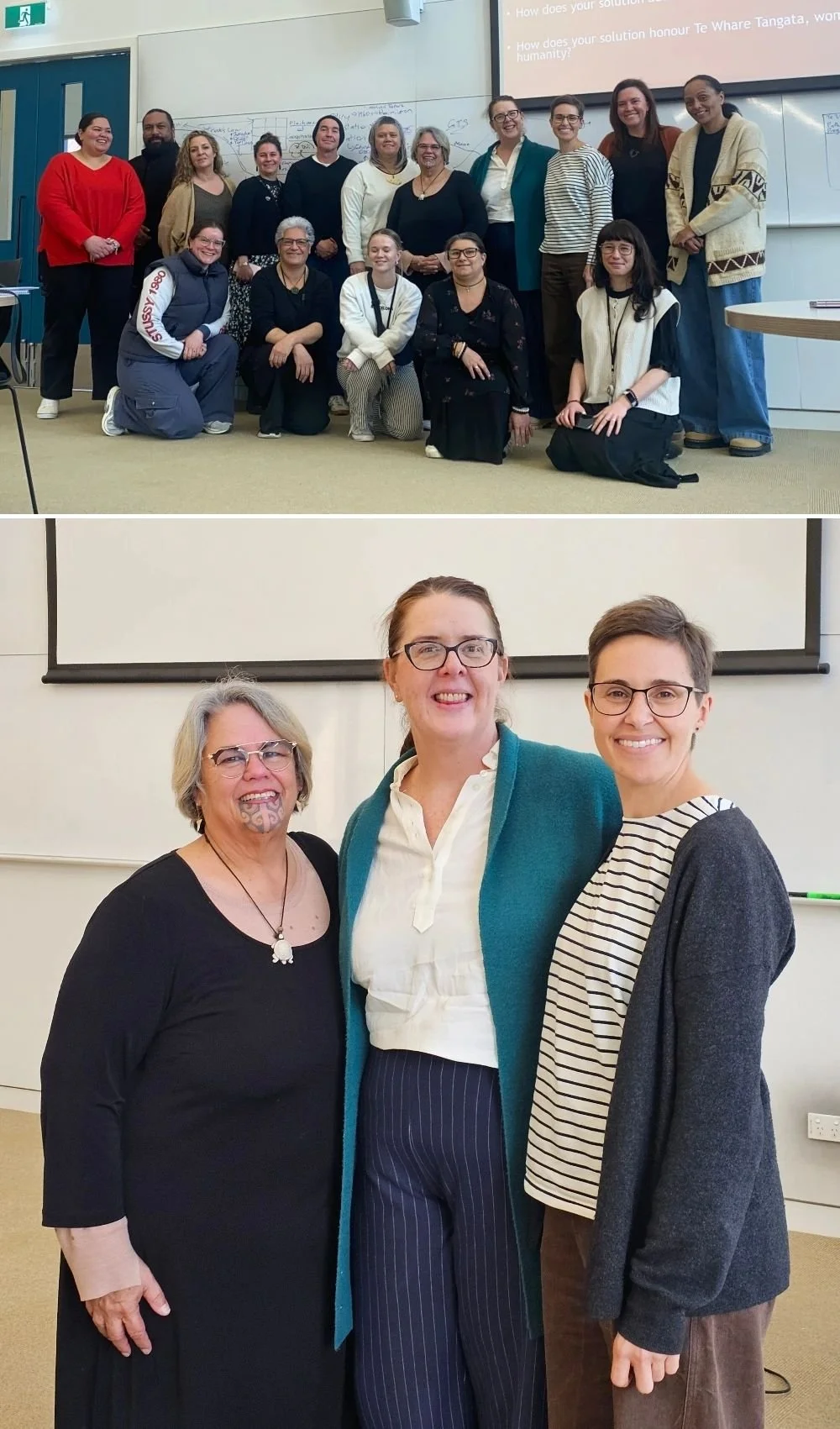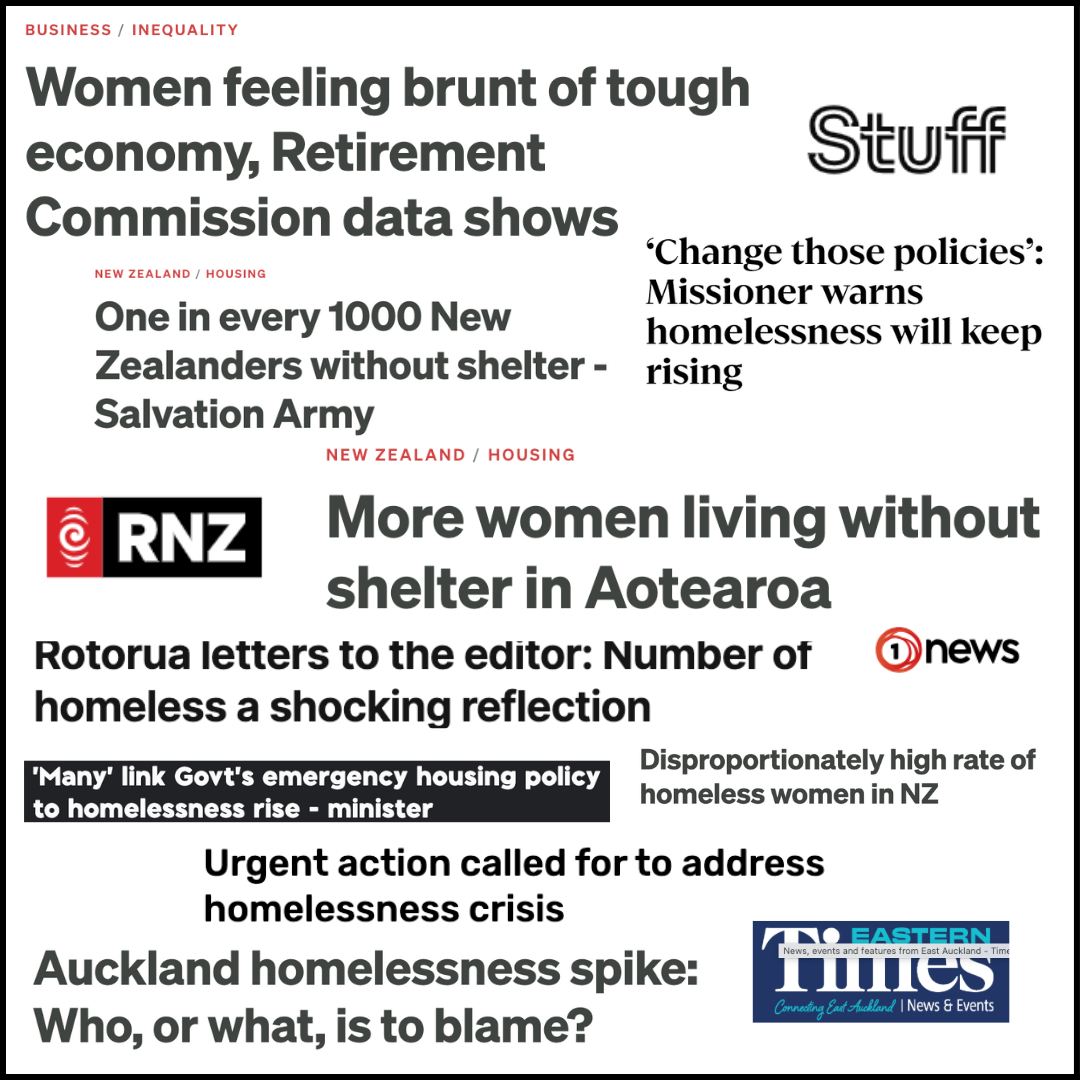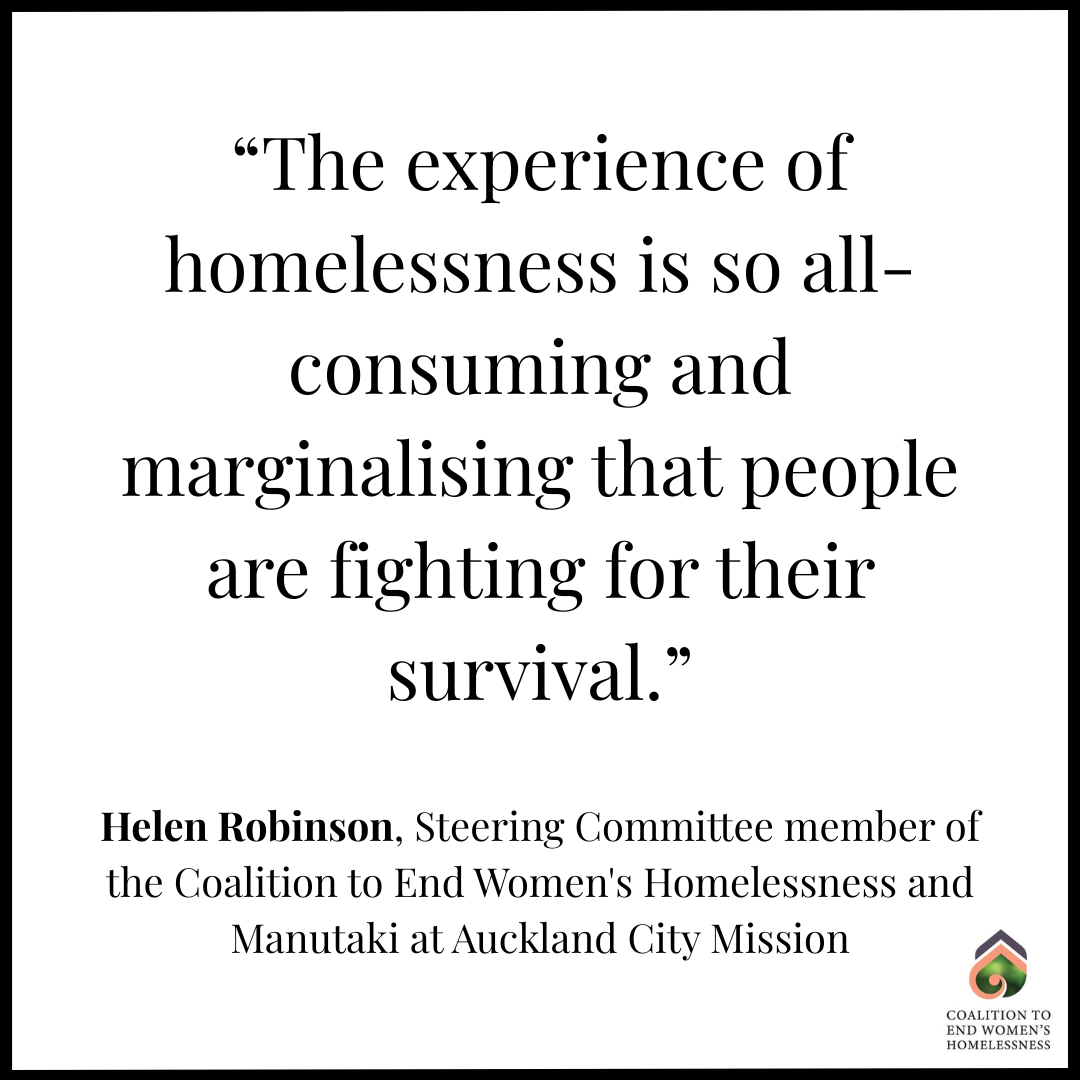August 2025 pānui
He waka eke noa
This whakataukī has several meanings, one of which is “a waka we are all in together” - we rise together, fall together, work together, and keep going together.
The past month has been a reminder that together we can create momentum and change and that together, we are doing just that.
We are especially excited to welcome two new members to the Coalition to End Women’s Homelessness - strengthening our capacity, our voice, and our shared vision.
We are honoured to welcome Dr. Kathie Irwin (Ngāti Porou, Rakaipaaka, Ngāti Kahungunu) as our Kaihautū, to co-lead our kaupapa. Kathie brings deep experience, sharp insight, and lived commitment to public service, education, and mana wāhine.
We also have the privilege of engaging Amanda Kelly as our Collective Impact Lead. Amanda currently leads policy and practice at CHA and will be critical to taking our policy and practice pou to the next stage.
Thank you Kathie and Amanda for joining us in the waka.
In the last month we have seen the power of collective advocacy in action. Our Steering Committee members and partners across the sector have been rising up and calling for change, amplifying voices of lived experience, and raising awareness through kōrero, media and community action. The momentum is growing.
We also acknowledge the powerful wānanga shared at CEWH’s recent workshop for our Gender Analysis with a Te Ao Māori Lens toolkit. The insights from kaimahi were courageous, honest and deeply rooted in kaupapa Māori approaches to systems change.
Every story, every voice, every connection matters. We are in the waka together.
Nāku noa,
Victoria Crockford
Project Director, Coalition to End Women’s Homelessness
NEWS AND VIEWS
Welcoming Dr. Kathie Irwin: Our Kaihautū
We are honoured and proud to welcome Dr. Kathie Irwin (Ngāti Porou, Rakaipaaka, Ngāti Kahungunu) as Kaihautū of the Coalition to End Women’s Homelessness, joining our Executive Director, Victoria Crockford, to lead this vital kaupapa.
As we breathe life into our Te Tiriti o Waitangi statement and respond to the profound reality that at least one in three women experiencing homelessness are wāhine Māori, Kathie’s leadership is both timely and powerful.
A treasured Māori researcher, educator, and strategist, Kathie brings decades of experience across public service, policy, and unwavering mana wāhine advocacy. Her kindness, wisdom, and fierce commitment to justice inspire us all. Having already collaborated on our toolkit Gender Analysis with a Te Ao Māori Lens, we know her insight and mana will lift our work and cultural strength.
“Ending homelessness for wāhine in Aotearoa is critical. I’m ready to roll up my sleeves and get stuck into the mahi,” says Kathie.
With Kathie guiding us, we step forward with renewed energy, pride, and hope for a future where every wāhine has a safe, warm place to call home.
Find out more about Kathie here
Dr. Kathie Irwin (Ngāti Porou, Rakaipaaka, Ngāti Kahungunu)
Welcoming Amanda Kelly: Collective Impact Lead
We’re thrilled to welcome Amanda Kelly to the Coalition to End Women’s Homelessness as our Collective Impact Lead.
Amanda joins us on secondment from Community Housing Aotearoa (CHA), where she has been leading sector collaboration in policy and practice. In her new role, Amanda will work closely with our Kaihautū Kathie Irwin to implement CEWH’s gender toolkit, establish communities of practice, engage with advocates and researchers, and create practical resources for the sector.
Originally from Ireland, Amanda has lived in Tāmaki Makaurau | Auckland since 2007 and brings extensive experience in community development, policy advisory, and leadership across local government and NGOs. She is passionate about centring community voice in decision-making and driving system change through collective action.
“I’m looking forward to working with CEWH to support a gendered approach to homelessness,” says Amanda.
We’re privileged to have Amanda join our team, bringing her insight, leadership, and commitment to this critical kaupapa.
Find out more about Amanda here
Amanda Kelly
Grounding gender analysis in Te ao Māori
At the end of July, alongside Dr Kathie Irwin, we had the honour of delivering two wānanga on our Gender Analysis with a Te Ao Māori Lens - one with the team at Auckland City Mission - Te Tāpui Atawhai, and another at Te Whare Tiaki Wāhine in Porirua.
In Tāmaki Makaurau, we were warmly welcomed by Helen Robinson, Manutaki at Auckland City Mission, and a group of deeply committed, thoughtful kaimahi. The energy in the room was electric - filled with insight, aroha, and a shared sense of purpose.
We journeyed across 1000 years of knowledge and experience to grapple with a core question: How do we translate evidence and wisdom into frontline practice in ways that support and empower wāhine?
Kathie reflected that the day at Auckland City Mission will stay with her for a long time:
“As an older Māori woman in this society I am often invisible. Even with my Moko Kauae, shucks perhaps in part because of my Moko Kauae. As soon as I walked into the ground floor of the HomeGround building I was greeted warmly by numerous people and asked if I needed help. Can I help? Are you meeting someone? Can we call you for them? Can we take you to them? It was very very moving.”
In our first workshop, we took a more academic approach - starting with the whakapapa of the framework, sharing the tool, and exploring its application. The kōrero was deep and the insights profound.
In the second session we were hosted by Caroline Herewini, Kaiwhakahaere at Te Whare Tiaki Wāhine, Porirua. Alongside her dedicated team of skilled and passionate kaimahi we tested Kathie’s emerging framework, The Papatūānuku Paradigm.
As Kathie said to close:
“Turou Hawaiiki! May the force be with us!”
Ngā mihi nui Kathie, for your mana, your wisdom and your wairua.
More to come on Gender Analysis with a Te Ao Māori Lens - watch this space.
Top photo: the fabulous kaimahi who participated in the workshop
Bottom photo: Dr Kathie Irwin, Helen Robinson and Victoria Crockford
Caroline Herewini gives powerful voice to hidden crisis of women’s homelessness
Last week, Caroline Herewini, Kaiwhakahaere at Te Whare Tiaki Wāhine Refuge and Steering Committee member of the Coalition to End Women’s Homelessness (CEWH), joined Dale Husband on Waatea News to speak about the rising crisis of women’s homelessness in Aotearoa.
Caroline shared insights from CEWH’s research report Ngā Ara ki te Kāinga, which reveals wāhine Māori make up around one-third of women experiencing homelessness. But beyond the statistics, she spoke of the lived realities of violence, vulnerability, and invisibility.
She told the story of a wāhine Māori rough sleeping in Porirua, mistreated by shopkeepers simply for being visible.
“You don’t see people berating rough sleeping men in the same way,” Caroline said, highlighting how homelessness is deeply gendered.
Many women avoid the dangers of the street by hiding in overcrowded or unsafe housing, becoming invisible to the public eye. For older women, the risk is rising, driven by elder abuse, relationship breakdowns, and economic hardship.
At Te Whare Tiaki Wāhine Refuge, the need often exceeds capacity.
“We can only have up to 12 women in our whare. That can be one whānau!,” Caroline said. “But we would never leave anybody out there without connecting them to a lifeline.”
Her kōrero is a call to action: when a woman is forced onto the street, it should raise alarm bells for us all.
“For a woman to be on the street – that is huge.”
Ngā mihi nui ki a koe, Caroline, me te whānau o Waatea News.
Read more about Caroline’s kōrero with Dale here
“Soup, Super and Survival” – older women and homelessness
In a powerful Sunday Star Times article by Kevin Norquay and Virginia Fallon, Victoria Crockford, highlighted the growing crisis of homelessness among older women.
Drawing on CEWH’s research, Vic explained that women over 65 are one of the most at-risk groups, yet their experiences remain largely invisible in housing data and policy.
The article also included the story of Dot, aged 82.
“I tick nearly every box -I’m female, live alone, renting, and I’ve only got the pension to live on,” she said.
Find out more here
Homelessness in Aotearoa: A national shame, but momentum is building
Over the past fortnight, women’s homelessness has been in the headlines. The scale and severity of the crisis is undeniable.
New data confirms what many of us already know: women are bearing the brunt of housing insecurity and homelessness in Aotearoa.
While the data and lived experiences continue to reveal the deep injustice faced by women across Aotearoa, it is also heartening to see people are listening. Ministers are being confronted with the evidence. Members of the public are speaking out. Questions are being asked in the media and across Parliament.
Momentum is growing. And with it, the hope that change is possible.
Here’s a round-up of recent coverage:
Disproportionately high rate of homeless women in NZ – RNZ Checkpoint
One in every 1000 New Zealanders without shelter – Salvation Army
Auckland woman horrified council tried to take rough sleepers' tents – RNZ
‘Shame on our country’: Homelessness raised with Ministers – RNZ
New data shows rise in Auckland homelessness – Inside Government
Government report: homelessness ‘appears’ to outstrip population growth – NZ Herald
“Not as easy as simply walking out” - new research reveals the hidden workload for abuse survivors
New research by Women’s Refuge, supported by Contact Energy, exposes the immense barriers victims of intimate partner violence (IPV) face when seeking safety. Survivors often endure a punishing journey through disconnected systems while managing trauma, financial insecurity, and, for many, homelessness. On average, victims had to engage with five different agencies and invest 21 hours of effort before receiving tangible help.
The research revealed that 30% of respondents struggled to find permanent and affordable housing after leaving violence, highlighting how escaping abuse often leads to new forms of housing insecurity.
CEWH Research: Family violence and women’s homelessness
CEWH’s research Ngā Ara ki te Kāinga highlights how IPV is a key driver of women’s homelessness. Many women shared experiences of physical, sexual, and psychological abuse that led to evictions, damaged homes, and being trapped in cycles of violence.
“We ended up in transitional [housing], and then I ended up getting a house. It was built brand new, and the abuse was still occurring. He ended up smashing up the whole house. It was really bad at that time; my babies would’ve been just walking,” said a woman who took part in our research.
Kaimahi shared how many women are forced to relocate to escape violence, but face additional barriers because of WINZ policies restricting access to emergency or transitional housing for people who have recently moved from other areas.
“They try and send them back to where they’ve come from, but if they’re in domestic violence [relationships], they’re not going to go back to where they’ve been abused, so they just end up on the streets until someone takes them in.” - Kaimahi
A systemic responsibility
Dr. Thorburn emphasises that creating pathways to safety requires a system-wide response - not just from specialist services like Women’s Refuge but from every organisation victims touch: Work and Income, the courts, health services, even housing providers.
In April, the government committed $540,000 over two years to bolster mental health support across Women’s Refuges. But Women’s Refuge says much more is needed to address systemic failures and reduce the “administrative load” survivors face.
Find out more about the Women’s Refuge report here
Where to get help
Women’s Refuge: 0800 733 843
Shine: Free call 0508 744 633 (24/7)
1737 Need to Talk? Free call or text 1737
Kidsline: 0800 54 37 54 (up to 18 yrs, 24/7)
What’s Up: 0800 942 8787 (ages 5-18)
Youthline: 0800 376 633 | Text 234 | talk@youthline.co.nz
In Immediate Danger? Call 111
“Where’s the strategy?”: Alison Cadman on women’s housing, hope and her new role
We’re thrilled to celebrate the appointment of long-time housing advocate Alison Cadman as General Manager for the new Caughey Preston Trust housing community for wāhine whai ora in Tāmaki Makaurau.
“This will be a place that offers not just housing, but healing, connection and care,” Alison says.
In her recent blog, Alison reflects on Dave Dobbyn’s song Welcome Home which was written 20 years ago and still heartbreakingly relevant today. She asks a question we find ourselves returning to again and again: “Where’s the strategy?”
In her own blog, CEWH Executive Director Vic Crockford shares a personal reflection on that same question, and on where she was in 2005, as Alison continued to raise the alarm:
“I was… now that I reflect on it, on an inexorable journey toward housing. I knew from my own experience the intergenerational transformation of a stable, secure home,” Vic writes.
After decades in this work, Alison continues to hope, push, and ask the hard questions. We’re proud to stand alongside her.
👉 Read Vic and Alison’s blogs here
Alison Cadman
Whānau poverty: New research reveals families are falling further behind
Child Poverty Action Group (CPAG) has released new research that lays bare the deepening financial pressure on low-income families in Aotearoa.
Below the Income Floor: Modelling Income Adequacy for Low-Income New Zealand Households, 2018–2026 examines 39 typical households - including single parents and sole adults, and asks a simple but vital question: Are incomes enough to meet basic needs and allow for a decent life?
The results highlight serious shortfalls:
In 2025, 8 out of 32 families with children cannot meet basic costs, and 15 cannot afford even minimal social participation.
Sole parent families with more than two children are hit hardest.
Benefits are falling behind, with recent policy changes eroding gains.
Even full-time minimum-wage work isn’t enough to lift many whānau out of poverty.
Rent, food, and power now eat up to 98% of income for some families.
Progress has stalled, and from 2024 to 2026, things are getting worse.
“Together, these findings show a poverty trap with three reinforcing sides: benefits falling below wages each year, a minimum wage that lags the actual cost of raising children, and living costs, especially housing and food, that rise faster than either income stream,” the report states.
We’re grateful to CPAG for this timely and essential research, which continues to shine a light on the realities facing low-income whānau and the need for urgent, sustained policy action.
Read the full report here
Barriers to Exit: How financial barriers prevent women from leaving abusive relationships
Good Shepherd New Zealand’s latest report sheds light on the devastating impact of economic abuse. Without financial independence, women can become trapped in abusive relationships - facing ongoing harm and hardship with no clear path to safety.
“There are many expenses involved with leaving an abusive relationship, and without accessible money it can be hard to start fresh. When including the cost of a bond to secure rental accommodation, the purchase of a car to escape, and all the associated costs of setting up a household, our analysis finds that the up-front cost of leaving an abusive relationship comes to nearly $10,000,” Good Shepherd New Zealand reports.
This financial burden can be an insurmountable barrier for women seeking safety, and a critical, yet often overlooked, driver of homelessness.
The connection is clear: Economic abuse is a direct pathway into homelessness. When women escape violence but are left with no income, no assets, and no housing options, they are forced to make very difficult decisions.
We acknowledge and thank Good Shepherd New Zealand for this important work, which deepens our collective understanding of the economic dimensions of gender-based violence and highlights the need for systemic support and change.
Read the full report here
POLICY AND POLITICAL INSIGHTS
Helen Robinson urges Auckland Council to act on women’s homelessness
Helen Robinson, Manutaki at Auckland City Mission - Te Tāpui Atawhai and Steering Committee member of CEWH, presented to Auckland Council’s Community Committee last week, calling for urgent action on rising homelessness.
She highlighted the alarming growth in rough sleeping in Tāmaki Makaurau, with at least 809 people now living without shelter - nearly double the number recorded eight months ago.
“These are our people and they need you and your voice,” Helen told councillors.
Drawing on CEWH’s research report Ngā Ara ki te Kāinga, she stressed that women are overrepresented in homelessness statistics, with nearly half of all homeless women in Aotearoa living in Auckland - yet no gender-responsive strategy exists.
“This is madness and our people are suffering … at the moment [women] don’t officially exist as a cohort.”
Helen warned that current emergency housing policies are directly contributing to the rise in street homelessness. The message to Council was clear: Policy change is urgent, and the time to act is now.
Both RNZ and The Post followed the proceedings.
Listen to RNZ here
If you cant get behind The Post’s paywall for the articles here and here, we have a blog about the story here
He iti te mokoroa, nāna i kati te kahikatea
The grub may be small, but it cuts through the kahikatea
Vic, Helen, Jo, Caroline, and Jill



